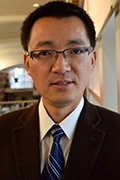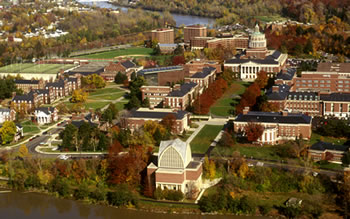 The University of Rochester in New York welcomed four new research scientists to their faculty in 2015. These new faculty members bring expertise in the fields of neurobiology, epigenetics, immunology, and molecular genetics to some of the over 1,000 clinical research projects being conducted at the University's Medical Center .
The University of Rochester in New York welcomed four new research scientists to their faculty in 2015. These new faculty members bring expertise in the fields of neurobiology, epigenetics, immunology, and molecular genetics to some of the over 1,000 clinical research projects being conducted at the University's Medical Center .
Over 3,000 Researchers at University of Rochester
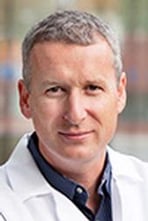 Dr. John J. Foxe, Professor of Neurobiology and Anatomy, now serves as the Chair of the Department of Neurobiology and Anatomy. He will be responsible for recruiting six to ten scientists in an effort to create new, cutting-edge research projects. He is also the inaugural Director of DelMonte Neuromedicine Institute (DNI). He and his research team work at the Cognitive Neurophysiology Laboratory. According to the lab’s website, their mission is to “Understand the underlying neurobiology of developmental disorders, with a specific emphasis on both adolescent Schizophrenia and Autism Spectrum Disorders.” To accomplish this, they are using state of the art technology such as “structural and functional neuroimaging, high-density electrophysiology, imaging genomics, eye-tracking, psychophysics and virtual reality techniques to understand the neural basis of sensory-perceptual and cognitive functions.”
Dr. John J. Foxe, Professor of Neurobiology and Anatomy, now serves as the Chair of the Department of Neurobiology and Anatomy. He will be responsible for recruiting six to ten scientists in an effort to create new, cutting-edge research projects. He is also the inaugural Director of DelMonte Neuromedicine Institute (DNI). He and his research team work at the Cognitive Neurophysiology Laboratory. According to the lab’s website, their mission is to “Understand the underlying neurobiology of developmental disorders, with a specific emphasis on both adolescent Schizophrenia and Autism Spectrum Disorders.” To accomplish this, they are using state of the art technology such as “structural and functional neuroimaging, high-density electrophysiology, imaging genomics, eye-tracking, psychophysics and virtual reality techniques to understand the neural basis of sensory-perceptual and cognitive functions.”
Dr. Foxe has over twenty years of experience studying developmental disorders. He has received more than $20 million in research funding from the National Institutes of Health (NIH), the National Science Foundation (NSF), and the Department of Defense, as well as other organizations. In an article for the URMC Newsroom, Dr. Foxe said, “It is only through research that we can develop new effective treatments, and I am committed to placing the DNI and the University of Rochester at the very forefront of these efforts.”
 The Department of Environmental Medicine added Dr. Martha Susiarjo as an Assistant Professor. She is also a member of the Environmental Health Science Center. With a PhD. in Genetics, she was awarded the Susan Heyner Award for Excellence in Research in 2013. She has had several articles published on the subject of epigenetics.
The Department of Environmental Medicine added Dr. Martha Susiarjo as an Assistant Professor. She is also a member of the Environmental Health Science Center. With a PhD. in Genetics, she was awarded the Susan Heyner Award for Excellence in Research in 2013. She has had several articles published on the subject of epigenetics.
Funded by an up to three year R00 grant from the National Institute of Environmental Health Sciences (NIEMS), her lab “investigates the underlying mechanisms of the developmental origin of health and disease... using imprinted genes as epigenetic markers to test the effect of environmental exposure on DNA methylation regulation on fetal and placental development… The lab employs bisulfite sequencing analysis, mouse genetics and embryology, molecular biology, and next generation sequencing.”
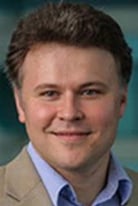 Dr. Felix Yarovinsky was brought on as an Associate Professor of Microbiology & Immunology in the Center for Vaccine Biology & Immunology. Before coming to URMC, Dr. Yarovinsky was an assistant professor of immunology at UT Southwestern. In 2013, he received the Investigators in the Pathogenesis of Infectious Disease Award to further investigate mechanisms of host defense against various infectious diseases. Recently, Yarovinsky's laboratory revealed a role for microbiota in controlling infections. Currently his lab is focused on clarifying the molecular mechanism of mucosal immune system recognition of parasites. The lab employs flow-cytometry, high-throughput sequencing, biochemistry, molecular biology, and highly specialized germ-free mice to discover novel mechanisms of host resistance and immune regulation in parasitic infection.
Dr. Felix Yarovinsky was brought on as an Associate Professor of Microbiology & Immunology in the Center for Vaccine Biology & Immunology. Before coming to URMC, Dr. Yarovinsky was an assistant professor of immunology at UT Southwestern. In 2013, he received the Investigators in the Pathogenesis of Infectious Disease Award to further investigate mechanisms of host defense against various infectious diseases. Recently, Yarovinsky's laboratory revealed a role for microbiota in controlling infections. Currently his lab is focused on clarifying the molecular mechanism of mucosal immune system recognition of parasites. The lab employs flow-cytometry, high-throughput sequencing, biochemistry, molecular biology, and highly specialized germ-free mice to discover novel mechanisms of host resistance and immune regulation in parasitic infection.
Dr. Bin Zhang is a new Assistant Professor in the Department of Pathology & Laboratory Medicine, as well as the Department of Pediatrics. He earned a Bachelor's of Science in Biology at the Sichuan University in China and received his PhD. in Molecular Genetics and Genomics from Washington University. His research interests include RNA-based disease biology, cancer biology, and biomarker discovery using genomic approaches. According to the URMC’s website, Dr. Zing’s research focuses on “molecular classification of B cell lymphomas, and development of novel NGS-based methodologies for efficient circulating tumor DNA (ctDNA) detection and nucleotide-level mapping of disease-associated chromosomal rearrangements.”
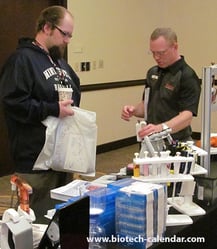

The University Rochester Medical Center (URMC) has a longstanding tradition of medical research breakthroughs. It is most recently known for developing three vaccines, including ones that help prevent cervical cancer, avian flu and bacterial meningitis. This $232 million enterprise involves thousands of scientists.
On Thursday, April 7th 2016 Biotechnology Calendar Inc. will host the 1st annual BioResearch Product Faire™ on campus. This will afford researchers the opportunity to meet face to face with laboratory equipment suppliers to discuss their equipment needs and see demonstrations of the latest advancements. Science professionals are invited to attend for free. Suppliers interested in taking advantage of this unique networking opportunity should contact Biotechnology Calendar at (530) 272-6675.


